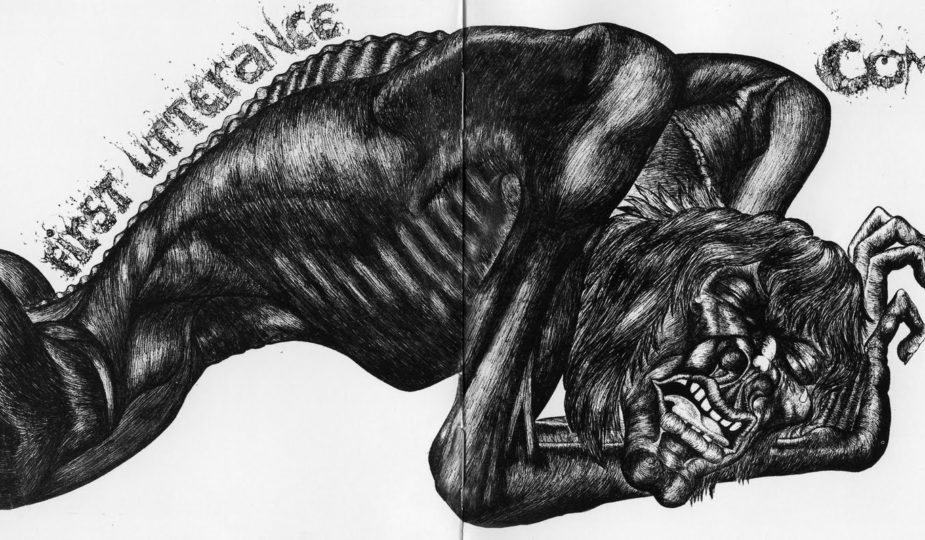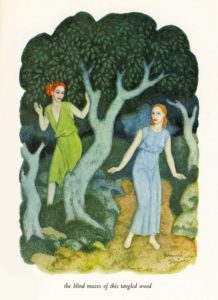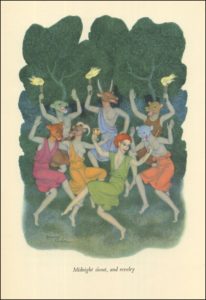
Comus – First Utterance (1971)
Comus is considered a debauched and decadent god of nocturnal revelry, son of Dionysus (in Greek mythology) or Bacchus (in Roman mythology), the god of drunkenness and wine. Comus is the character whose name is the title of a masque written by the poet John Milton presented in 1634 at Ludlow Castle in Shropshire, on the border between England and Wales. In Milton’s masque, Comus is also the son of the deceptive goddess Circe. Comus is described in the opening of Milton’s play as “roving the Celtic and Iberian fields” and hiding himself “immured in cypress shades”, in an “ominous wood, in thick shelter of black shades embowered.” The plot of the play involves the Lady and her two brothers walking through the wild wood. The Lady becomes a “misled and lonely traveller” lost in the “blind mazes of this tangled wood” where she meets Comus, disguised as a shepherd who, within this “leafy labyrinth” attempts to seduce her. She breaks out of Comus’ trance and sees his crew of “ugly-headed monsters.” She resists him and her virginity, her virtue, remains intact. The educational moral theme was written by Milton to honor his patron, John, Earl of Bridgewater, President of Wales, and his family.
Bacchus (in Roman mythology), the god of drunkenness and wine. Comus is the character whose name is the title of a masque written by the poet John Milton presented in 1634 at Ludlow Castle in Shropshire, on the border between England and Wales. In Milton’s masque, Comus is also the son of the deceptive goddess Circe. Comus is described in the opening of Milton’s play as “roving the Celtic and Iberian fields” and hiding himself “immured in cypress shades”, in an “ominous wood, in thick shelter of black shades embowered.” The plot of the play involves the Lady and her two brothers walking through the wild wood. The Lady becomes a “misled and lonely traveller” lost in the “blind mazes of this tangled wood” where she meets Comus, disguised as a shepherd who, within this “leafy labyrinth” attempts to seduce her. She breaks out of Comus’ trance and sees his crew of “ugly-headed monsters.” She resists him and her virginity, her virtue, remains intact. The educational moral theme was written by Milton to honor his patron, John, Earl of Bridgewater, President of Wales, and his family.
Comus is also a British band from Bromley, Kent who named themselves after this grotesque god and recorded their debut album First Utterance with vocalist Roger Wootton’s lyrics heavily inspired by Milton’s masque and the band’s acid folk instrumentation conjuring an atmosphere of Walpurgis Night. The setting (“April buds in primrose season”) (“fog, fire, lake, moorish fen”) of Milton’s Comus seems to take place on April 30 – Walpurgis Night. In ancient and medieval eras, Walpurgis Night was one of the most supernatural nights of the year (alongside Halloween), a night when ghosts roam free, a night when witches conduct rituals and cast spells, a night when the veils between the worlds are at their thinnest. Walpurgis Night has inspired both classical music (Hector Berlioz’s “Dream of the Witches’ Sabbath” and Modest Mussorgsky’s Night on Bald Mountain) and literature (Goethe’s Faust). Comus’ First Utterance is such a rare record – the perfect soundtrack for Walpurgis Night.
Amazing acoustic and electric guitar playing by Glenn Goring; beautiful background vocals by female singer Bobbie Watson; demented and demonic lyrics and vocals by Roger Wootton; experimental Fender and slide bass by Andy Hellaby; freakish and frenzied gypsy violin by Colin Pearson; pastoral flute and oboe by Rob Young; tribal percussion – all of these eccentric elements create a macabre, madcap mood.
I will never forget my first listen to First Utterance on April 30, 2004 (Walpurgis Night), the night of a magic mushroom  trip. The album is dark enough even sober so unless you are an especially experienced psychonaut; I do not recommend this album on hallucinogens because it is one of the most disturbing records. What makes First Utterance so much scarier is that it has the strangest sequencing. Two of the tracks do not fit with the others: “The Bite” about a Christian martyr’s execution and the closing track “The Prisoner” about an asylum mental patient suffering shock therapy, the record spinning to its crazed conclusion with the word “insane” echoing back and forth between each of your ears. Although you can certainly play the record as it is, I’ve always felt that it has less of a narrative arc this way. The Christian martyr is out of place and the asylum mental patient does not make much sense with the previous songs, unless perhaps all of these were figments of his deranged imagination? (I think it is worth it to hear these two tracks, however, I separate them from the others.)
trip. The album is dark enough even sober so unless you are an especially experienced psychonaut; I do not recommend this album on hallucinogens because it is one of the most disturbing records. What makes First Utterance so much scarier is that it has the strangest sequencing. Two of the tracks do not fit with the others: “The Bite” about a Christian martyr’s execution and the closing track “The Prisoner” about an asylum mental patient suffering shock therapy, the record spinning to its crazed conclusion with the word “insane” echoing back and forth between each of your ears. Although you can certainly play the record as it is, I’ve always felt that it has less of a narrative arc this way. The Christian martyr is out of place and the asylum mental patient does not make much sense with the previous songs, unless perhaps all of these were figments of his deranged imagination? (I think it is worth it to hear these two tracks, however, I separate them from the others.)
My own personal sequencing of the songs on this album is, as follows—–
- Song to Comus
- Diana
- Bitten
- Drip Drip
- The Herald
The album ends up as five tracks, rather than seven, and its running time shortens from 49 to 38 minutes. However, I find this sequencing far more satisfying.
“Song to Comus” opens with an acoustic guitar and flute that exhale spring and summer. Comus awakes in the afternoon and sees a “virgin fair smile so sweet” while she walks in the woods. He bewitches the maiden. The acoustic guitar and flute grow more strong and urgent. The vocals of Roger Wootton and Bobbie Watson grow more sinister. Roger Wootton’s cackling echoes as he sings “Comus laughs, soon comes the night.” “Through the forest, dark and deep, she follows Comus’ dancing feet, he moves away the mossy stone, reveals the cave, Comus’ home.” No one hears her screams as she is raped by Comus. Roger Wootton’s perverted lyrics and goblinish grunts are joined by primitive percussion and voracious violin.
The lurching electric guitar by Glenn Goring and slide bass by Andy Hellaby continue the fear. Colin Pearson, who wrote this song, is the leader. Halfway through the track, his violin sounds like it is summoning the “baying of the hounds” in the “steaming woodlands” and Rob Young’s hand drums are a chase scene as Diana “kicks her feet up” and runs from Comus. Bobbie Watson’s graceful tone of voice joined with Andy Hellaby’s and Glenn Goring’s backing vocals completely contrasts with Roger Wootton’s creepy croaking.
“Bitten” is a frightening instrumental co-written by bassist Andy Hellaby and violinist Colin Pearson. Where “Diana” rushes by the listener’s ears in a flashing rush, “Bitten” is the protagonist slowing down after the hunt. She stops to rest. The buzzing, droning, hissing, screeching sounds are a horror movie suspense scene. She sees eyes in the shadows of the trees. She hears a howling. She notices a clawed hand grasping her shoulder. She is startled. She turns – it is too late. The fangs sink into the side of her throat.
Bizarre bluesy slide guitar by Glenn Goring opens “Drip Drip”, the darkest song on the album featuring Roger Wootton’s most depraved lyrics and shocking vocals. Comus has killed the maiden. He is mesmerized by her murder. Her corpse is described as “soft white flesh” “slaked with blood” and soon “caked with mud.” Comus is a cannibal and necrophiliac. Halfway through the track, the album’s climax enters with buggy bass, primordial and pummeling percussion, violent violin, and weird voices – Comus and his crew celebrating.
If you have made it this far, you will now understand why I sequenced the songs this way. The night is ending and the blue light promises refuge and rest after the night’s lunacy. The full moon is fading in the periwinkle silvery skies. Eerie glissandos from Glenn Goring’s guitar (who co-wrote this track with bassist Andy Hellaby and lyricist Roger Wootton) are the gloaming mists as Bobbie Watson finally is the lead vocalist. Her enchanting vocals and Rob Young’s floating flute enhance this song’s mysterious, otherworldly vibes. She sings about a different god, the “Herald”, who, like her, is lonely, as he “walks across the earth eternally.” Glenn Goring’s gorgeous 12-string acoustic guitar is immersive and intricate, the ghost of the girl moving through the mists of the twilight. Colin Pearson’s cosmic violin and Rob Young’s flute, green and nostalgic, are the sounds of morning. Beltane, the first day of May, dawns. Comus disappears as the rising sun shines.
by Mark Lager

I acquired the album First Utterance in 1971 from a radio station engineer who worked for KPRI in San Diego. Even though KPRI was an “underground “ off the hook type of station at the time, First Utterance was considered extreme and not aired. Album was played once on KPRI and then given to me.
Outstanding harmony and blending of instruments.
Highly interesting album and review. The idea of experiencing First Utterance on any sort of hallucinogenic scares me more than, well…watching The exorcist in the same state. Not that anyone should avoid this album. It’s a highly imaginative and a complete original piece of work. Your review really provides an excellent context for the experience. Finding information on this album can be difficult. Your knowledge and insight provides a real understanding into just what new (and old) listeners are getting themselves into. The music reminds me of the film Midsommar which I saw last year.
Hi, Shawn. I agree with your comment.
This record definitely shares a similar vibe with Midsommar’s claustrophobic and suffocating atmosphere, I really liked that film. The Haxan Cloak’s soundtrack for Midsommar is also great.
Today I gave an opportunity to this record (following Mark’s sequence), it was my first listen. What an amazing recommendation !.
Agreed with you Shawn about the creativity of Comus – First Utterance.
So bizarre, like some strange cultist ritual. I absolutely love this. Wow!
Agreed Torben! That’s why I feel it’s the perfect soundtrack for Walpurgis Night.
Very intriguing story and review. The sounds are completely weird and delirious (in a good way), I found some similarities with some of the most deranged records of Xiu Xiu (one of my favorite bands). “Herald” is one of the best songs that I´ve heard recently.
Cheers for introducing this new band to me, Mark. Even David Bowie came to appreciate them !.
Agreed Octavio about “The Herald”–its atmospheric, ghostly, mysterious mood and spellbinding soundscapes are trance-inducing.
Great essay! Essential record for those who are passionate and for all lovers of mysterious folk prog. To play at home as a relic !!!
Agreed Andi! Experimental folk. Mesmerizing and otherworldly.
Creepy sounds 😱
Agreed Lee! Scary soundscapes!
When listening to this years ago, I had to think of a fairytale forest with the most bizarre mythical creatures. Weird and grotesque, but certainly very unique album.
Agreed Alan! Bizarre, creepy, dark, eerie folk! Lost in a murky wilderness.
This is weird and genius!
Agreed Pand! Strange and stunning!
I did listen to this record, after I got your review. I guess I am not made for Walpurgisnacht, record and story scare the hell out of me. I wouldn’t survive it on drugs…
Saliha,
Scary music and stories. Thanks for sharing my essay.